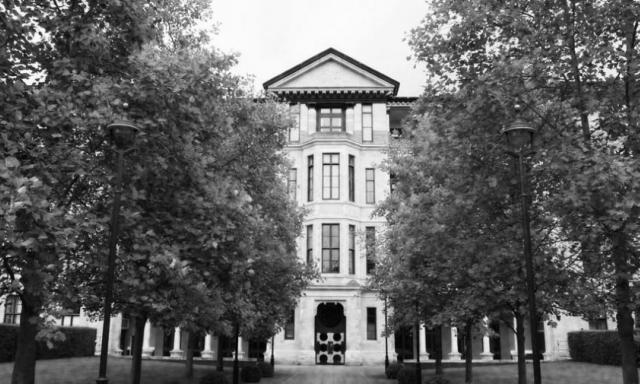

 Article
Article

 Scholars from three continents convened in Washington, D.C., for the annual Entrepreneurship and Innovation Research Conference, hosted by the University of Virginia Darden School of Business and the University of Cambridge Judge Business School.
Scholars from three continents convened in Washington, D.C., for the annual Entrepreneurship and Innovation Research Conference, hosted by the University of Virginia Darden School of Business and the University of Cambridge Judge Business School.

Insights from
Scholars from three continents convened in Washington, D.C., at the United States Institute of Peace in May for the annual Entrepreneurship and Innovation Research Conference, hosted by the University of Virginia Darden School of Business and the University of Cambridge Judge Business School. The conference, organized by Judge Business School and Darden’s Batten Institute for Entrepreneurship and Innovation, has a seven year history of offering researchers the opportunity to share ideas with peers who have diverse approaches to investigating entrepreneurship and innovation.
After two successful iterations of the conference located in Cambridge, U.K., the conference returned to the U.S. The co-chairs, Professor Michael Lenox, Ph.D. candidate Andrew King (both from Darden) and Professor Stelios Kavadias (Cambridge Judge) experimented with the conference’s traditional ties to Charlottesville and Cambridge; this was the first time the event took place in the Washington, D.C., area, where Darden enjoys a presence through this and other thought leadership events, as well as delivery of executive formats of its MBA program and Executive Education courses.
Professor Lenox welcomed scholars in attendance with remarks reaffirming the conference’s mission to advance the connections between the distinct entrepreneurship and innovation research streams. Lenox explained, “We founded the conference with the idea of bringing together the diverse array of academics who study entrepreneurship and innovation. You come from a variety of different fields, from economics, sociology and operations, in addition to entrepreneurship and strategy. By bringing this community together, our networks will grow, and we’ll each gain exposure to a diversity of literature and methods.”
Professor Kavadias shared his vision for the conference’s impact on advancing research in these symbiotic fields, which are important for economic growth. Professor Kavadias and his colleague Hanadi Jabado, the executive director of the Entrepreneurship Centre at Cambridge Judge, are in the early stages on planning the 2017 event scheduled for next spring in Cambridge.
The presentation format has been tailored specifically to help authors gain feedback from senior scholars who have experience publishing in selective academic journals. Each author had 20 minutes to present his or her theories, evidence and conclusions. Invited discussants provided comments designed to help authors refine their papers prior to submission to top-ranked peer-reviewed journals. Topics covered included the strategic impacts of early venture-capital funding on startups, the nature of teams that lead to successful startups, how learning and overconfidence impact entrepreneurial decisions, and startup and exit operations. Twelve presentations sparked numerous debates and will undoubtedly led to new research ideas and collaborative partnerships.
Darden Finance Professor Elena Loutskina discussed a paper written by Federal Reserve Board Section Chief Rebecca Zarutskie. Zarutskie investigated entrepreneurial spirit and her findings suggest that the entrepreneurial spirit is essential in startup employees. She evaluated whether the employees and founders of startups tend to leave companies once the latter reach the IPO stage. She found evidence that startup employees and founders leave successful IPOs for younger, more entrepreneurial firms, potentially to avoid feeling stifled as their firms mature and turn to traditional corporate practices. The evidence sparked a lively debate about the cyclical nature of entrepreneurial activity and its exponential impacts to economic activities.
The keynote address from MIT Sloan School of Management Professor Scott Stern laid out a framework for understanding the entrepreneurial innovation process. He designed his remarks to inspire future research and spur scholars to build theories that can guide founders’ strategic decision-making. The address pivoted around the concept that entrepreneurship and innovation are driven by a fundamental paradox. Entrepreneurs must make strategic decisions using their available information, however the information and knowledge that they need doesn’t exist — they must take action in order to generate novel and exploitable information. Entrepreneurs must embark on a path knowing that other options will no longer remain available. For instance: the difference between Nespresso and Starbucks. Both companies have built their value propositions around coffee, however they deliver that value in vastly different ways. Both firms made early decisions that took them down diverging paths — delivering quality coffee quickly versus delivering an experience. Defining entrepreneurship and innovation as a paradox has many implications for theory and how founders and innovation managers alike make strategic decisions.
Professor Stern’s address epitomized the spirit of the conference — connect entrepreneurial ideas with innovation strategy and spur new theories that can advance organizations’ ability to have an impact on society.
The Entrepreneurship Paradox: Insights From the Darden and Cambridge Judge Research Conference